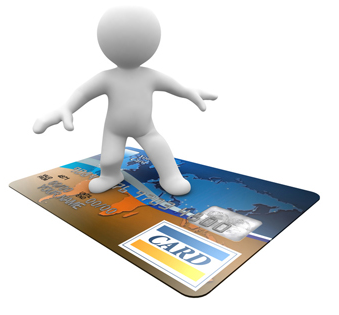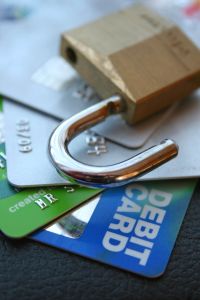
This last month I was able to pay off all my credit card debt. I’m not paying a single penny to the credit card companies anymore. It’s the first really big goal I’ve been able to achieve with my finances. It feels great and this is how I did it.
Step 1) Be really annoyed by interest (and fees) you are paying. This was the foundation of the goal to pay off all my balances. Every month I would look at my statement or check my personal finance software and see INTEREST PAYMENT or FEE coming from my credit card company. These words started really annoying me. The amount I paid in interest payments was the equivalent to doing something nice every month. When I calculated how much interest I was paying it made my resolution even stronger to pay off all my cards.
Step 2) Switch to an all cash budget. There is no question this step took the biggest bite out of our credit card debt. We used the envelope method of budgeting and it worked. One consideration to switching to cash is losing out on the credit card points. When I tallyed the sigh-up bonuses and other rewards I was actually in the red at the end of it all. Saying good-bye to using credit cards regularly was an adjustment but it feels good to use cash again. Another thing with envelope budgeting is that when the money is gone it’s gone. Prioritizing is something I haven’t done in a while and it feels good. I generally get the stuff I really need and don’t miss out on too many things.
Step 3) Sell Junk Laying Around. You would be surprised at how much valuable stuff you have laying around your house. Think about all the old things you don’t use anymore and make a list. Post your items on craigslist and put the cash you make towards your debt. This exercise helped me realize how much crap I’ve bought over the years and makes me think twice before I buy anything else.
Step 4) Use all extra income towards your debt. Paying the minimum payment won’t cut it anymore. When you get a bonus, raise, or cash put it towards your debt.
Step 5) Cancel your cards. Pull your free credit report and look over all your accounts. Pay off and close all your credit cards as soon as you can. Some people will argue that keeping your accounts open will help improve your credit score but Dave Ramsey would counter by saying you don’t really need a credit score because you’re not going to use debt like a junkie anymore.
In Summary
This is a big deal for us because we had a lot of credit card debt. We bought a fixer upper home and put all the improvement costs on our credit cards. In retrospect that wasn’t the best idea but we’ve learned what not to do in the future. We are now using all the extra money we would have made on credit card payments and are applying it to our student loan, second mortgage, and other debt.
Please share you experiences in the comments if you’re actively paying down debt or are living a debt free lifestyle.


